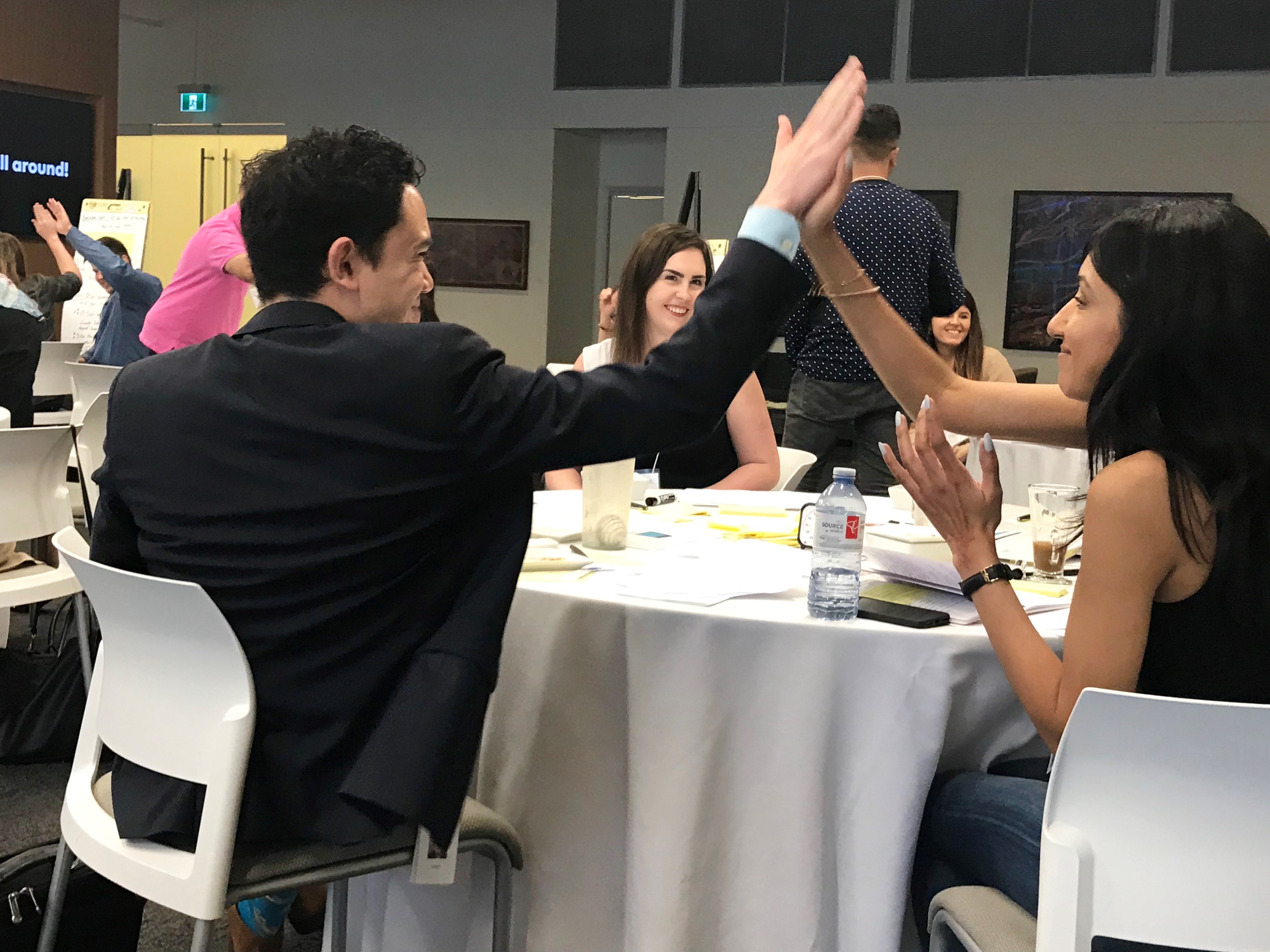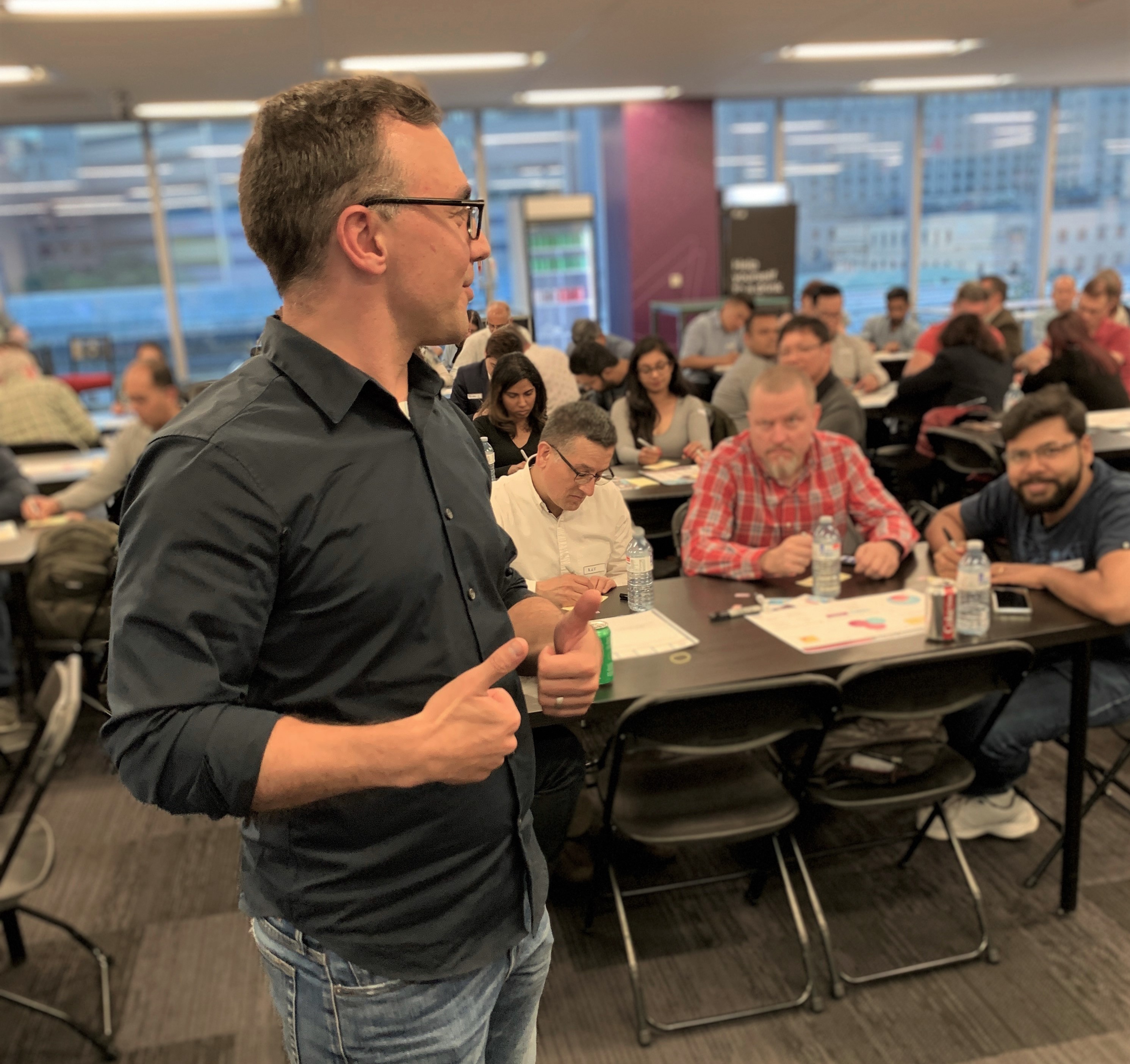If you’re involved – or especially leading – any kind of innovation in your organization, one thing you can absolutely count on is that you’ll be facilitating a lot. Facilitation skills are a key element in the modern professional work world, and a foundational skill set for an innovation professional.

The ways in which you will facilitate will come in many different formats with different purposes, from ideation to collaborative projects, to formal workshops, to training. You’ll be running all sorts of (way more effective) meetings and will be involved in a variety of team liftoffs.
Some may ask, isn’t facilitation just another word for “presentation”? No – absolutely not. While both (should) effectively share knowledge (hopefully communicated in an engaging manner), facilitation is about guiding a group of people along a sequence of mini milestones to achieve a specific outcome.
 The role of the facilitator is to guide the process without undue influence, moving the group through barriers and sticking points to that end goal or outcome, typically through a well-structured process made up of interactive activities. Because of its participatory nature, facilitation sessions often accelerate learning and concept absorption, assuming the facilitator is effective!
The role of the facilitator is to guide the process without undue influence, moving the group through barriers and sticking points to that end goal or outcome, typically through a well-structured process made up of interactive activities. Because of its participatory nature, facilitation sessions often accelerate learning and concept absorption, assuming the facilitator is effective!
Think about your last group collaboration – how did it go? What are some of the things you noticed? Was it hard to get people on the same page? How were disagreements tackled? Did the session stay on task? Did everyone get to voice their opinions and perspectives? Were there tangible outcomes at the end you feel confident about?
Hopefully it went well, but the fact is, often collaborations don’t go as well as we hoped. Emotions can run high, sustained engagement is challenging, and we easily get distracted, sidetracked or derailed from the goal. Often, many people leave a meeting or collaboration feeling frustrated.
Effective facilitators are excellent at navigating all of the above and more. Trained, experienced facilitators can accomplish a lot of important things in organizations of all sizes, particularly in an innovation context. Let’s look at a few we find particularly important.
Initiate a Smooth Liftoff
High-level facilitators leverage their knowledge to identify the right kind of facilitation format to use in a given environment and to accomplish a specific goal or outcome. They know what structure or systematic process to use, what pre-work is required (and how to do it), what activities to do and when, what materials will be needed, what team or group to pull together, and how (and when) to communicate that to participants.
They know how to set the meeting expectations, and to address concerns and questions not only at the outset, but throughout. Because of this, expert facilitators can keep the group focused on the end goal, moving them through the journey step by step.
Manage Emotions and Human Relationships

Innovation often introduces a lot of unknowns and uncertainty – innovation facilitation or workshops in particular. Typically it’s representative of something “new” or a new way of working.
Skilled facilitators have cultivated their emotional intelligence and can successfully support participants as they move through any discomfort they may be feeling as a result. They’re adept communicators sensitive to the emotional shifts in the room, continually creating and recreating a safe environment to try out these “new ways.”
They also have the experience and ability to align participants quickly and to keep alignment going throughout – even in the face of disagreement. They quickly pick up on power dynamics and relationship tensions, and using their experience and expertise, can neutralize any potential consequences.
Real-Time Analysis and Adaptability
High-level facilitators are constantly evaluating the current situation to assess multiple key things:
- How is everyone doing – are they aligned, are they engaged, are they moving forward? How are they reacting to the activities/content, is everyone enjoying the process?
- How are they working together – is it challenging? Are there tensions? Is everyone contributing effectively? What barriers are getting in the way of better collaboration?
- How is the process working – are we on target? Are we on time? What is distracting us? What isn’t working well/what is?
As they evaluate, they’re also adjusting as they go, leveraging a combination of their EQ skills, hard skills and soft skills to successfully navigate the facilitation feedback loop. A helpful tool in the skilled facilitator’s toolbox is the ability to pull out insights and to connect to broader themes as part of the constant feedback loop.
So how do you become a successful and effective facilitator?
Mostly through practice, and if you’re involved in innovation, you’ll get a lot of that! Practice makes perfect, as they say.
There are also tons of great resources out there. One of our favourites is Gamestorming. You’ll find a bunch of incredible ideas and step-by-step activities for any number of facilitation goals here. Definitely check it out!
Facilitation training like the Advanced Facilitation for Design & Innovation on Nov 21 in Toronto is probably a great idea for those who haven’t had a lot of opportunity to test out their facilitation legs.
Like all innovators and disruptors, facilitation has been a core element of both of our careers and is the anchor service of AdaptiveX.
In this public training workshop we’ll share not only what we’ve learned about facilitation, specifically in the worlds of innovation and design, but also some of the theory and best facilitation techniques out there that underpins all great facilitation.
Professional Facilitator Program Services at AdaptiveX
Looking for expert facilitation to launch projects or liftoffs? We offer a range of facilitation workshops and programs, including design sprints, product development and OKRs. Visit our Services page for more information on our programmatic facilitation options.
Or maybe you’re looking for ways to build facilitation skills inside your organization or team through in-house group facilitation courses? No problem – we can help with that too! Check out our Training page for more information on our training programs.